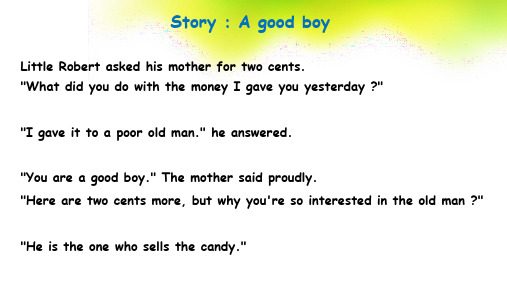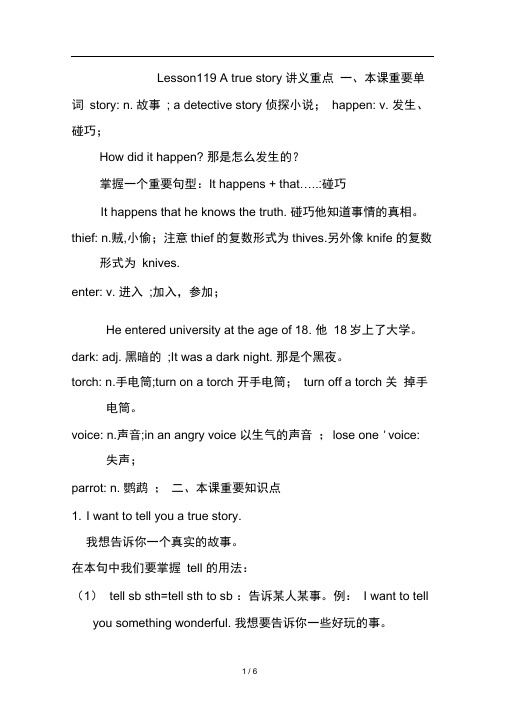新概念英语119课讲义全
新概念英语第一册第119课 PPT课件

story happen thief enter dark torch voice parrot
read
n. v. n. v. adj. n. n. n.
故事 发生 贼 进入 黑暗的 手电筒 (说话的)声音 鹦鹉
单词PK
黑暗的
进入
发生
grammar
过去完成时:表示过去某个时刻之前已经完成 的动作,我们叫它“过去的过去”。
Key words&expressions
7. voice n. ①声音 in a high/ low voice
voice 表示人说话时嗓子发出的声音 sound 表示世间万物的声音 noise表示噪音
Key words&expressions
8. parrot n. 鹦鹉
By
结构:by(截止)+过去时间 截止到上个学期我已经学习了2000单词。 I had leant 2000 words by last term. 截止到上个星期我已经看了5部电影。 I had seen 5 films by last week.
1. I __C____ 900 English words by the time I was ten。
7、Suddenly, they heard a voice behind them. hear-heard- heard
Language points
8、What's up? 【口语】
= What’s wrong? = What’s the matter? 【寒暄】What’s up, man? 询问对方最近过得如何。
Video Questions on the text
新概念一册第119课件

• story n. • 1) 故事,小说 • a detective story 侦探小说 • 2)(关于某事的)陈述,说法 • Her story is hard to believe. • 她的说法很难令人相信 • It’s another story. • 那是另一回事。 • 3)(口语)谎话,说谎者 • Don’t tell stories. • 不要撒谎。
• in a sad voice • 他以伤心的声音告诉了我这个消息。
• He told me this news in a sad voice. • lose one’s voice 嗓子变哑 • 我因重感冒,嗓子都哑了。 • I’ve lost my voice because of a bad cold.
• dark • 1) adj. 黑暗的 • 太暗了,无法看书 • It’s too dark to read. • 2) 深色的,暗色的 • 她的眼睛是深色的。
• She has dark eyes. • 3) 阴暗的,忧郁的,暗淡的 • The future looked dark in those days. • 那时觉得前途暗淡。 • 4)n. 黄昏,傍晚,黑夜(通常不加冠词) • before dark 天黑以前
• The film had already begun when I got there. • 我回来之前,他们己经离去。
• They had left before I came back. • 表示由过去某一时间开始,一直延续到过去另
一时间的动作或状态。 • 我在车站等了20分钟,一辆公共汽车终于来
• While my friend, George, was reading in bed, two thieves climbed into his kitchen.
新概念英语第一册第119课经典课件(精心整理)学习资料

Key words&expressions
❖ 8. parrot n. 鹦鹉
Video Questions on the text
❖ 1.When did the story happen?
❖ 2.What was George doing when the thieves entered the room?
enter for 报名参加 Our team has entered for the competition. 我们队已报名参加比赛.
Key words&expressions
❖ 5. dark
light
❖ adj. ①黑暗的 too dark
❖ ②深色的 dark blue
❖ ③阴暗的 dark future-- bright future
❖ I happened to meet her on my way home. 在回家的路上,我碰巧遇 见了她。
❖ I happen to know that professor. 我正好熟悉那位教授。
Key words&expressions
❖ 3. thief n.贼 复数:
thieves ❖ A World without Thieves
Key words&expressions
❖ story
n.
❖ happen
v.
❖ thief
n.
❖ enter
v.
❖ dark
adj.
❖ torch
n.
❖ voice
n.
❖ parrot
n.
❖ 手电筒 (说话的)声音
鹦鹉 练习本
Key words&expressions
新概念lesson119-120

新概念lesson119-120讲义过去完成时定义:过去某一时间或动作之前已经发生或完成了的动作或状态。
它表示句子中描述的动作发生在“过去的过去”。
基本结构主语+had+过去分词vpp.(done)①肯定句:主语+had+过去分词.②否定句:主语+had+not+过去分词.③一般疑问句:Had+主语+过去分词?肯定回答:Yes,主语+had.否定回答:No,主语+had not .④特殊疑问句:特殊疑问词或词组+一般疑问句(Had+主语+过去分词)?基本用法(1)表示在过去某一时刻或动作以前完成了的动作,也可以说过去的时间关于过去的动作。
即“过去的过去”。
通常有这些时间状语。
by + 过去的时间点如:I had finished reading the novel by nine o'clocklast night.by the end of + 过去的时间点如:We had learned over two thousand English words by the end of last term.before + 过去的时间点如:They had planted six hundred trees before last Wednesday.(2)表示由过去的某一时刻开始,一直延续到过去另一时间的动作或状态,常和for, since构成的时间状语连用。
例如:I had been at the bus stop for 20 minutes when a bus finally came.当车来的时候,我在车站已等了20分钟。
He said he had worked in that factory since 1949.他说自从1949年以来他就在那家工厂工作。
(3)过去完成时常常用在told,said,knew,heard,thought等动词后的宾语从句(或间接引语)中,这时从句中的动作发生在主句表示的过去的动作之前。
新概念1 Lesson 119 课件

Suddenly , they heard a voice behind them. 'What's up?What's up?'someone called. The thieves dropped the torch and ran away as quickly as they could.
"You are a good boy." The mother said proudly. "Here are two cents more, but why you're so interested in the old man ?"
"He is the one who sells the candy."
过去进行时
1. 过去某个时间段正在进行或发生的动作。 主语 + was/were + V.ing
2. 当过去两个动作同时发生时,要用when/while连接。 My mother came in , when I was cooking.
I played basketball yesterday.
Notes on the text
happened to:发生在某人身上 Let me tell you what happened to me once. 让我告诉你曾经发生在我身上的事. happened on:偶然遇到或发现 He happened on the book in a
2024年新概念英语NCE1_lesson119-120(共33页)课件

4. Paul went(go) out with Jane after he had made(make) a phone call.
5. They had learned(learn) over 2000 words by the end of last term.
6. I have a lot of work to do(do).
(D)3. She said she ___the principle already.
A .has seen
B. saw
C. will see D.had seen
(D)4.A friend of ___ is a doctor. A.me B.my C.I D.mine
(C)5. She had written a number of books ______ the end of last year. A.for B.in C.by D.on
4.当安下楼时,小偷已走开了。 When Ann came downstairs,the theif ___ already ____.
1.我要给你讲一个真实的故事。 I want to tell you a true story.
2.当他到达车站时,火车已离开了。 When he got to the station,the train had already gone.
questions
1.When did two thieves climb into the kitchen?
2.How is Henry?
happen
1.A car accident happened to her
this morning.
2.What happened to you? 3.What happened to Helen last night? 4.I am very sorry for all happened to
新概念英语119课讲义

Lesson119 A true story 讲义重点一、本课重要单词story: n. 故事; a detective story 侦探小说;happen: v. 发生、碰巧;How did it happen? 那是怎么发生的?掌握一个重要句型:It happens + that…..:碰巧It happens that he knows the truth. 碰巧他知道事情的真相。
thief: n.贼,小偷;注意thief的复数形式为thives.另外像knife 的复数形式为knives.enter: v. 进入;加入,参加;He entered university at the age of 18. 他18岁上了大学。
dark: adj. 黑暗的;It was a dark night. 那是个黑夜。
torch: n.手电筒;turn on a torch 开手电筒;turn off a torch 关掉手电筒。
voice: n.声音;in an angry voice 以生气的声音;lose one 'voice: 失声;parrot: n. 鹦鹉;二、本课重要知识点1. I want to tell you a true story.我想告诉你一个真实的故事。
在本句中我们要掌握tell 的用法:(1)tell sb sth=tell sth to sb :告诉某人某事。
例:I want to tell you something wonderful. 我想要告诉你一些好玩的事。
I want to tell something wonderful to you. 我想要告诉你一些好玩的事。
(2)tell sb to do sth: 告诉某人去做某事;例:She told me to finish my homework on time. 她告诉我要按时完成作业。
I told him to turn on the light. 我告诉他打开灯。
新概念1第119课 课件

Pair work
D:Did you read the book? Yes,but I saw the film first.
→ I read the book after I
had seen the film.
Make a sentence.
1.had +Ved
• Remember the new words; • Review the key points of L119;
• Read L119 fluently.
name
time
mark
1.
2.
3.
4.
5.
6.
7.
8.
9.
e.Who’s Herry?
Pair work
A: She went home. She typed the letter.
→ She went home after she had
typed the letter.
Make a sentence.
B:Have you met him?
过去动作之前完成的动作.
2. after,before引导过去完成时 的用法.
Homework:
• 1.listen to the tape five times every day;
• 2. Recite Lesson 119; • 3.Write the important sentenses; • 4.Finnish P243 A B C D各选两题.
name
time
mark
1.
2.
3.
4.
5.
6.
7.
8.
- 1、下载文档前请自行甄别文档内容的完整性,平台不提供额外的编辑、内容补充、找答案等附加服务。
- 2、"仅部分预览"的文档,不可在线预览部分如存在完整性等问题,可反馈申请退款(可完整预览的文档不适用该条件!)。
- 3、如文档侵犯您的权益,请联系客服反馈,我们会尽快为您处理(人工客服工作时间:9:00-18:30)。
Lesson119 A true story讲义重点
一、本课重要单词
story: n. 故事; a detective story 侦探小说;happen: v. 发生、碰巧;
How did it happen? 那是怎么发生的?
掌握一个重要句型:It happens + that…..:碰巧…..
It happens that he knows the truth.
碰巧他知道事情的真相。
thief: n.贼,小偷;注意thief的复数形式为thives.另外像knife的复数形式为knives.
enter: v. 进入;加入,参加;
He entered university at the age of 18. 他18岁上了大学。
dark: adj. 黑暗的;It was a dark night. 那是个黑夜。
torch: n.手电筒; turn on a torch开手电筒;turn off a torch关掉手电筒。
voice: n.声音; in an angry voice 以生气的声音;lose one’s voice:失声;
parrot: n. 鹦鹉;
二、本课重要知识点
1. I want to tell you a true story.
我想告诉你一个真实的故事。
在本句中我们要掌握tell的用法:
(1)tell sb sth=tell sth to sb:告诉某人某事。
例:
I want to tell you something wonderful.
我想要告诉你一些好玩的事。
I want to tell something wonderful to you.
我想要告诉你一些好玩的事。
(2)tell sb to do sth:告诉某人去做某事;例:
She told me to finish my homework on time.
她告诉我要按时完成作业。
I told him to turn on the light.
我告诉他打开灯。
2. It happened to a friend of mine a year ago.
这是一年前发生在我的一个朋友身上的故事。
在本句中我们要掌握happen的具体用法:
(1)happen to sb:某事发生在某人身上;例:
She hoped nothing bad would happen to him.
她希望不会有坏事发生在他身上。
(2)happen to do sth:碰巧…….;
I happened to see him on the street.
我碰巧在大街上遇到他了。
(3)It happens + that……碰巧……:
It happens that the actor is her brother.
那个演员碰巧是她的哥哥。
It happens that she also likes swimming.
碰巧她也喜欢游泳。
3. 掌握以下重要短语:
A friend of mine:我朋友中的一个。
Turn on a torch:打开手电筒。
What’s up?: 什么事?
Run away:逃跑;
As quickly as possible:尽可能快地;
Come downstairs:下楼;
Go back to sleep:回去睡觉;
4.重要语法:过去完成时。
过去完成时指过去某一时刻或动作以前己经完成的动作,或由过去某一时间开始,一直延续到过去另一时间的动作或状态,主要用来表示“过去的过去”。
(一)基本结构
主语+had+动词的过去分词,例:
I had been at the bus stop for 20 minutes when a bus
finally came。
我在车站等了20分钟,一辆公共汽车终于来了。
He left the room after he had turned off the light. 他把灯关上之后,离开了房间。
动词过去分词的规则变化:
①一般情况下,在动词后加ed构成:work / worked, stay / stayed, shout / shouted等。
②在以-e结尾动词后只加d:close / closed, like / liked, live / lived, smile / smiled等。
③以辅音字母加y结尾的动词,应将y改为i 再加-ed:study / studied, carry / carried等。
④以重读闭音节或r音节结尾且末尾只有一个辅音字母动词,要双写末尾的辅音字母再加-ed:stop / stopped, admit / admitted, refer / referred, prefer / preferred等。
(二)基本用法:
过去完成时指过去某一时刻或动作以前己经完成的动作,或由过去某一时间开始,一直延续到过去另一时间的动作或状态,主要用来表示“过去的过去”。
例:
He said he had been to Beijing twice.
他说他已经去过两次。
(去这一动作在“说”之前已经完成,即“过去的过去”)
The bus had already left by the time I got there.
等我到那的时候,汽车已经开走了。
(汽车开走这一动作发生在我“到那”之前。
)
He said he had worked in that factory since 1949.
他说自从1949年以来他就在那家工厂工作。
(由过去的时间1949一直延续到过去某一时间)
(三)句型转换
①在过去完成时做主句的情况下,把肯定句转换成疑问句只需要把had提到主语前面即可,例:
The bus had already left by the time I got there.(变疑问句)
等我到那的时候,汽车已经开走了。
Had the bus already left by the time you got there? 你到那的时候汽车已经开走了吗?
They had planted six hundred trees before last Wednesday
在上周三以前他们已经种了六百棵树了。
Had they planted six hundred trees before last Wednesday?
在上周三以前他们已经种了六百棵树了吗?
②在过去完成时做主句的情况下,把肯定句转换成疑问句只需要在had后面加not即可。
例:
They had planted six hundred trees before last
Wednesday
在上周三以前他们已经种了六百棵树了。
They had not planted six hundred trees before last Wednesday
在上周三以前他们还没有种到六百棵树。
The bus had already left by the time I got there.
等我到那的时候,汽车已经开走了。
The bus had not left by the time I got there.
等我到那的时候,汽车还没有开走。
(四)标志词
过去完成时连用的时间状语有:
①by + 过去的时间点。
I had learnt six hundred words by last night.
②by the end of + 过去的时间点。
We had finished our work by the end of last term.
③before + 过去的时间点。
She had already left before I got there.。
